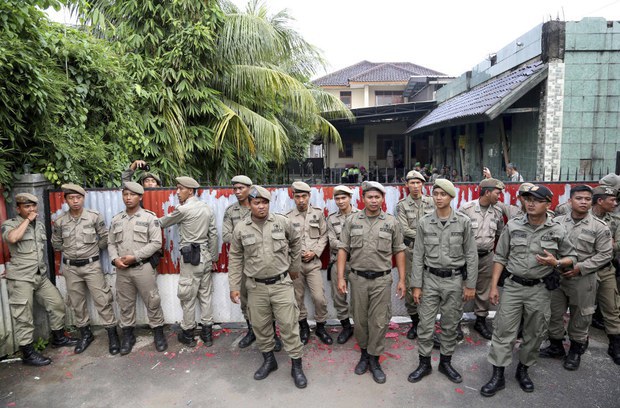Dozens of Houses of Worship Closed, Vandalized in Indonesia: Rights Commission
2020.11.06
Jakarta
 Local government security officers stand guard outside an Ahmadiyya mosque compound in Depok, Indonesia that was shut by authorities after Muslim groups called for protests against the minority group, Feb. 24, 2017.
Local government security officers stand guard outside an Ahmadiyya mosque compound in Depok, Indonesia that was shut by authorities after Muslim groups called for protests against the minority group, Feb. 24, 2017.
At least 23 houses of worship in Indonesia were forcibly closed or vandalized over the past three years, as religious minorities in the world’s largest Muslim-majority nation continued to face discrimination, the National Commission on Human Rights (Komnas HAM) said Friday.
The cases recorded from 2017 to 2019 are likely the tip of the iceberg as many such incidents are not formally reported to Komnas HAM, according to its chairman, Ahmad Taufan Damanik.
Only 21 cases were reported to the commission in the previous period of three years, mostly in greater Jakarta, he said.
"Although statistically the increase in the number of complaints submitted to Komnas HAM is not too high, these were actual events that occurred in our communities," he said in a video conference.
Incidents reported to Komnas HAM included the forced closure of an Ahmadiyya mosque following complaints from the local community in the city of Depok, near Jakarta, in 2017, he said.
Ahmadiyya congregations have often been targets of persecution by authorities and hardline Islamic groups. In 2011, an attack by a group of men armed with machetes on a house where about a dozen Ahmadis were gathering in the town of Pandeglang, West Java killed three people.
In 2017, authorities sealed off a building being constructed by the As Sunnah Islamic foundation in Gresik, East Java, saying it did not have a permit. Police took action after complaints by local Muslims who accuse As Sunnah of adhering to Wahhabism, an austere form Islam practiced in Saudi Arabia.
In February 2019, the government of North Lombok on Lombok island stopped the construction of a Hindu temple ostensibly to “maintain peace and order” in the mainly Muslim community.
In the same year, the local government in Bantul, Yogyakarta revoked a construction permit for a Pentecostal Christian church following a rejection from local Muslims.
Taufan said a decree on religious harmony and places of worship issued by the Ministry of Home Affairs and the Ministry of Religious Affairs in 2006 was partly to blame for the discriminatory acts, and urged the government to revise it.
The decree stipulates that a religious congregation must obtain signatures of support from 60 local households of a different faith before building a house of worship.
"If there is no clear and firm action on the 2006 decree, freedom of religion and beliefs will continue to face hurdles," said Taufan.
Paulus Tasik Galle, an official at the Center for Religious Harmony at the Ministry of Religious Affairs, said the regulation was based on an agreement among councils of different religions.
“If we want to review it, we have to leave it to the religious councils,” he said at the discussion with Komnas HAM.
‘Veto power’
Earlier this week, a senior official at the Religious Affairs Ministry said the 2006 regulation should be elevated to the status of a presidential decree, to get regional officials more involved in resolving interfaith disputes, as well as more funding for government-backed forums that promote interfaith harmony.
"This increase in the level of the regulation could strengthen ... the commitment of regional leaders to religious harmony and moderation," Nizar Ali, the secretary-general of the Ministry of Religious Affairs, was quoted as saying in an article on a ministry website.
Human Rights Watch said in May that the regulation allows the majority religious group in each area to have veto power over religious minorities.
“As a result, most minorities in predominantly Sunni Muslim Indonesia have difficulties establishing or renovating their houses of worship,” it said.
“The veto power has empowered Muslim extremists to take the law into their own hands, pressuring local governments to close down houses of worship of minority religions,” it said.
Despite a pledge by Joko “Jokowi” Widodo to scrap the regulation during his campaign for the presidency in 2014, it remains in force. The vice president Jokowi chose for his second term – Ma’ruf Amin – was one of its authors.
The Tirto.id news website said at least 32 churches were closed during Jokowi’s first five years in office.
The United States Commission on International Religious Freedom (USCIRF) in its 2020 annual report recommended that Indonesia be placed on “the U.S. Department of State’s Special Watch List for engaging in or tolerating severe violations of religious freedom pursuant to the International Religious Freedom Act (IRFA).”
“In 2019, religious freedom conditions in Indonesia generally trended negatively compared to the previous year,” the report said in its chapter on Indonesia, the world’s largest Muslim-majority nation.
Citing reports from local NGOs, the commission listed “discrimination, hate speech, acts of violence and rejections of permits to build houses of worship for minority religious communities” as types and examples of intolerance.
USCIRF is an independent, bipartisan U.S. federal government commission created by the 1998 International Religious Freedom Act. The commission monitors the universal right to freedom of religion or belief abroad and makes policy recommendations to the U.S. president, secretary of state, and Congress.







